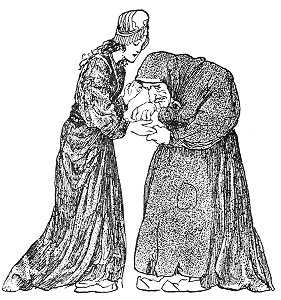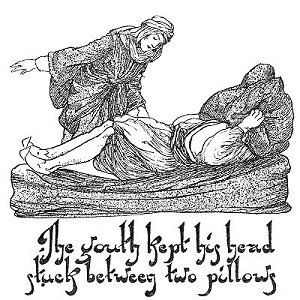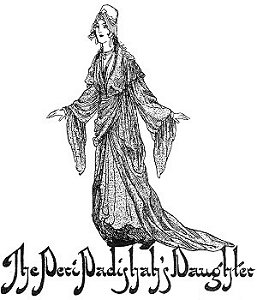
Forty-four Turkish Fairy Tales [1913], at sacred-texts.com
 |
 |
Once these girls saw a gipsy passing along the street, and said to each other: "Let us have our fortunes told." All agreeing, they called the old woman, who, having had her hand crossed with silver, said to the eldest of the sisters: "Thy kismet is at the bottom of a well." To the middle sister she said: "Thy kismet is in the cemetery"; and to the youngest she said: "Thy kismet is in shame." Having uttered these ominous words, the gipsy disappeared.
One day while the eldest girl was spinning, her thread broke, the spindle flew up ward, then fell and rolled over and over until it suddenly disappeared down the well. "Oh dear!" she exclaimed, "my spindle is in the well; help me to recover it." Her sisters bound a rope round her body and let her down the well.
Now when the girl reached the bottom she saw an iron gate. She opened it, and entering saw a youth and a maiden lying asleep, a baby in a cradle by their side. She took off her shawl and covered the youth and the maiden with it;
and her eyes lighting on a knife, she picked it up and stuck it in her girdle. This accomplished, she re. turned to the mouth of the well and gave the signal to her sisters to pull her to the surface. Arrived at the top, she was asked why she had been so long down the well. "I sought my spindle until I found it," was the answer, and with that they had to be content.
 |
Going up and down the streets, he came at length to the house wherein dwelt the three sisters. They called him in and chose distaffs, needles, and
silks; and when they asked the price the merchant told them he could not accept money for the articles, but would take an old knife. Upon this the eldest sister produced the knife she had brought up out of the well.
This he accepted in exchange for the goods, then went home and told his mother she must go to the maiden who had delivered him from the peri and ask her in marriage for him. The lady went on her son's behalf; the maiden consented to become his wife, and in due time the wedding took place.
 |
The youth was a shahzada who had once been very ill, and the man was a physician on whom the sick Prince's beauty had made such an impression that he could not endure the thought of being parted from him. "I will cure you," said the physician one day, "but only if you promise to obey me ever after." The Prince would not agree, and the physician in revenge administered to the Prince a stupefying draught, on which he fell into a deathlike trance. His parents, believing him dead,

Click to enlarge
''I would rather die,'' answered the youth
buried him in the vault, and there every night went the physician to torment the poor youth until he should yield to his wishes.
Having witnessed this dramatic scene, the maiden waited till day dawned, then went home, purchasing a plateful of lokma on the way, as she was very hungry, While eating it she observed that all the people in the shop were weeping, and she inquired the cause. "The Shahzada died forty days ago," they said, "and his lokma remains on our hands." On this she requested to be taken before the Sultana, for whom she had an important message.
She was accordingly conducted to the palace, and when the Sultana appeared the maiden informed her that her son was not dead as she supposed, but alive. "Give him to me for my husband and I will restore him to you," said the maiden to the Sultana.
"My dear, you are surely mad," answered the Sultana. "He died forty days ago; today his bones must be all that is left of him." The maiden, however, swore that the Shahzada was still alive. "If you do not believe, come with me this night and I will show you
your son." The Sultana consulted the Padishah on the matter, and at night they went to the cemetery. Here they concealed themselves and watched. At midnight the physician appeared, opened the tomb, and having restored the Shahzada to consciousness, put his question, and received the same answer as before. Hearing their son's voice the royal parents hastened to the tomb and, weeping, pressed him to their hearts. Later the wicked physician had his head struck off, and the maiden who had been the means of restoring the Prince was united with him in marriage.
 |
When the youngest sister knocked at the door her speech and pretty face gave great pleasure to the old parents. They received her kindly, and
 |
In the evening food was set before the young pair, but the young man never deigned to raise his head from his cushions. So the maiden ate both portions, after which she lay down and pretended to sleep, keeping an eye on the young man over the top of the bedcover. When he thought she was asleep he got up quietly, opened the door, and went upstairs. The girl followed him stealthily and saw his meeting with a lovely creature, beautiful as the full moon, who greeted him with these words: "O my bey, why have
you been so long? I was tired of waiting; if you had delayed longer I should have left you." The youth explained what had happened, and how he had been obliged to wait until the girl was asleep.
The lovely maiden was the daughter of the Padishah of the Peris, whom the youth had first seen in a dream and fallen in love with. "If you will look at no other woman but me," the peri-maiden had said, "I will visit you every night." Thus it was that the youth stuck his head between the pillows and refused to glance at any other woman. When the peri maiden heard of the youngest sister she said: "If you look at her but once, you will never see me again."
As soon as the eavesdropper heard these words she returned to the room and locked the door. When the youth returned to his own room, he found the door locked against him. There was no alternative but to beg the maiden within to open the door for him. She answered that she would let him in only on his solemn promise to converse with her awhile. As there was no avoiding it, he promised. The maiden, opening the door, let him in, and as his glance fell on her a wall rose up by magic between the stairs and the door--a sign that the peri-maiden would never more return.
The youth's parents blessed Allah for the change in their son's disposition, and were so pleased with their strangely found daughter-in-law that they celebrated the marriage with festivities lasting forty days and forty nights.